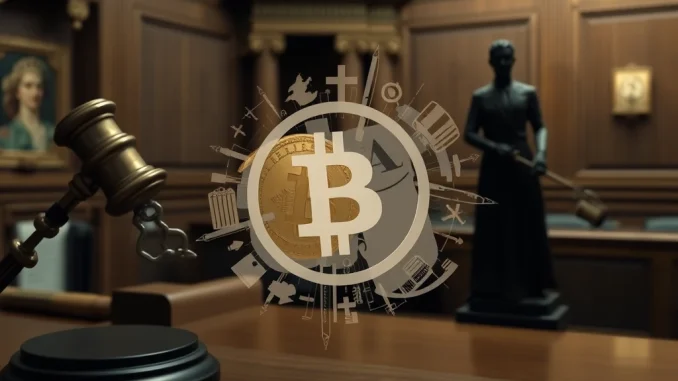
The legal landscape for cryptocurrency privacy tools remains complex, and a recent development involving Samourai Wallet highlights this complexity. News has emerged that the New York Attorney General (NY AG) is considering dropping its separate lawsuit against the founders of the popular privacy-focused wallet application.
What is Samourai Wallet and Why the Legal Trouble?
Samourai Wallet is known for offering advanced features aimed at enhancing transactional privacy for Bitcoin users, primarily through techniques like CoinJoin. While proponents argue these tools are essential for financial anonymity and security in a transparent blockchain world, law enforcement agencies increasingly view them as facilitators for illicit activities.
The core of the legal trouble stems from allegations that the wallet’s services were used to launder significant amounts of money. The U.S. Department of Justice (DOJ) previously took major action:
- They filed a lawsuit against Samourai Wallet co-founders Keonne Rodriguez and William Lonergan Hill.
- The charges include allegations of operating an unlicensed money transmitting business and conspiracy to commit money laundering.
- The DOJ claims the service facilitated over $2 billion in illegal transactions and laundered more than $100 million in criminal proceeds.
- Rodriguez and Hill were arrested in April 2024.
The New York AG’s Separate Action and Potential Withdrawal
Following the DOJ’s action, the New York Attorney General’s office also filed a lawsuit against the Samourai Wallet founders, making similar claims about their operations violating state laws regarding virtual currency businesses and money transmission.
However, CoinDesk recently reported that the NY AG is now considering withdrawing its lawsuit. While the exact reasons for this potential withdrawal are not publicly detailed, possibilities could include:
- Avoiding duplication of effort with the ongoing federal DOJ lawsuit.
- Strategic focus shifts within the NY AG’s office.
- Jurisdictional considerations given the federal charges.
It’s important to note that considering a withdrawal is not the same as actually dropping the case, but it signals a potential shift in the legal pressure from the state level.
What Does This Mean for the DOJ Lawsuit and Crypto Privacy?
While the New York AG’s potential withdrawal is a notable development, the primary legal battle for Samourai Wallet’s founders remains the federal case brought by the DOJ. These are serious criminal charges carrying significant potential penalties.
This situation underscores the ongoing tension between crypto privacy tools and regulatory efforts aimed at combating money laundering and illicit finance. Authorities globally are scrutinizing services that offer enhanced anonymity, leading to enforcement actions against mixers and privacy wallets.
The outcome of the DOJ lawsuit against Rodriguez and Hill will likely set precedents for how crypto regulation treats privacy-enhancing technologies moving forward. It raises crucial questions about where the line is drawn between providing financial privacy for law-abiding citizens and facilitating criminal activity.
Actionable Insights for Users
For users of privacy wallets or those interested in crypto privacy, this case serves as a stark reminder of the regulatory risks involved. It’s crucial to:
- Understand the technology you use and its legal standing in your jurisdiction.
- Be aware of the potential for services to be targeted by law enforcement.
- Stay informed about developments in crypto regulation and ongoing legal cases like the DOJ lawsuit involving Samourai Wallet.
Summary: A Shifting Legal Landscape
The news that the New York AG is considering dropping its lawsuit against Samourai Wallet founders provides a moment of complexity in an already high-stakes legal battle. While the state-level pressure might ease, the significant federal charges from the DOJ lawsuit remain the primary concern for Keonne Rodriguez and William Lonergan Hill. This case is a critical focal point for the future of crypto privacy and the broader efforts by authorities to enforce crypto regulation.



